Developing Manager Report: Skills, Goals and Career Development
VerifiedAdded on 2020/11/23
|22
|6264
|379
Report
AI Summary
This report, titled "Developing Manager," delves into the multifaceted aspects of managerial development within the context of the hospitality industry, specifically comparing Four Seasons Hotels and Resorts and Grosvenor Group. It begins by contrasting different management styles, highlighting transactional, democratic, laissez-faire, and transformational approaches, along with their respective classical and systems theories applications. The report then analyzes leadership characteristics, motivational theories (including Maslow's hierarchy), and conflict resolution strategies. A comparative analysis of communication processes within businesses is also provided. Furthermore, the report includes a personal SWOT analysis to assess the author's skill set, and the setting of SMART objectives for skill development. Finally, it addresses career development skills and offers recommendations for improvement, demonstrating a comprehensive understanding of the skills needed for effective management and leadership.
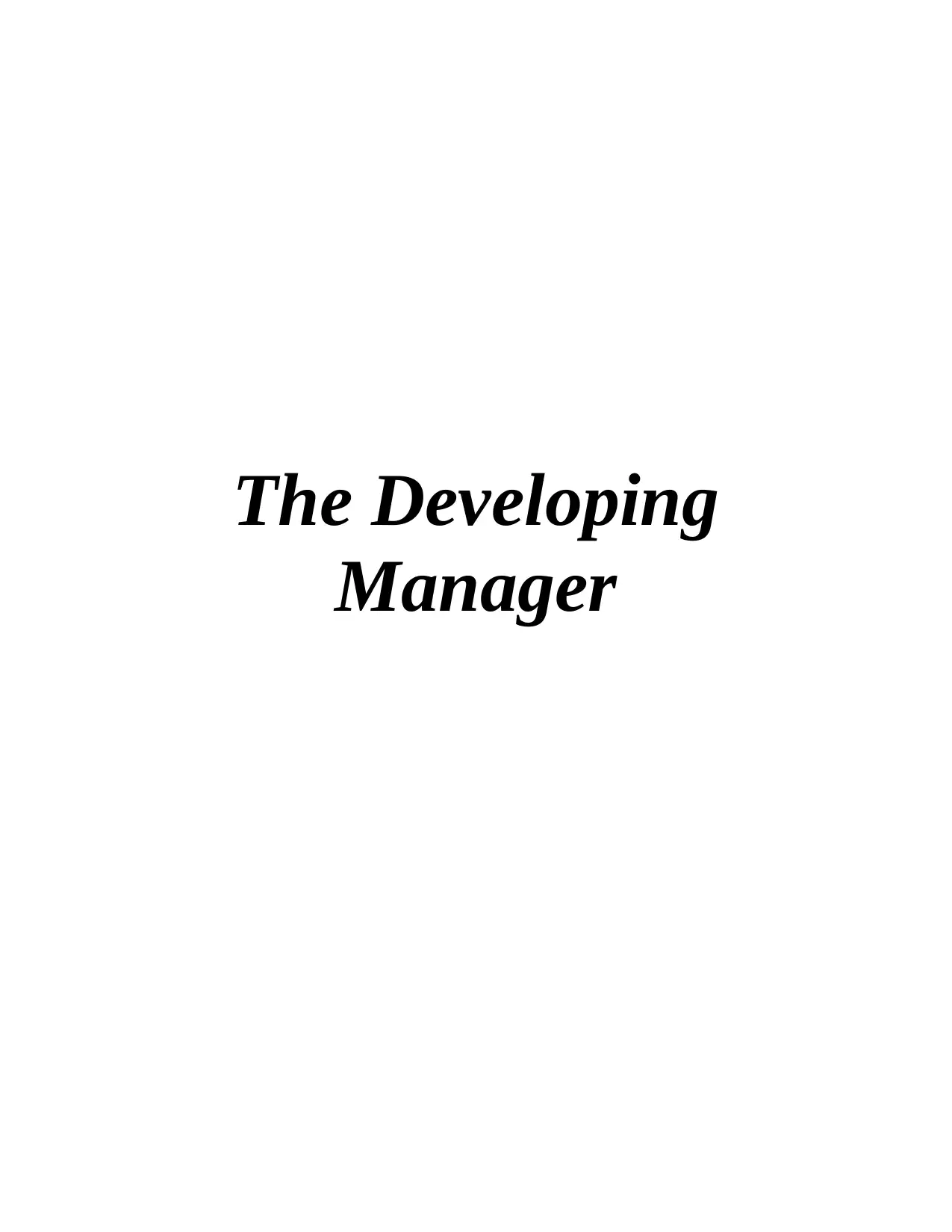
The Developing
Manager
Manager
Paraphrase This Document
Need a fresh take? Get an instant paraphrase of this document with our AI Paraphraser
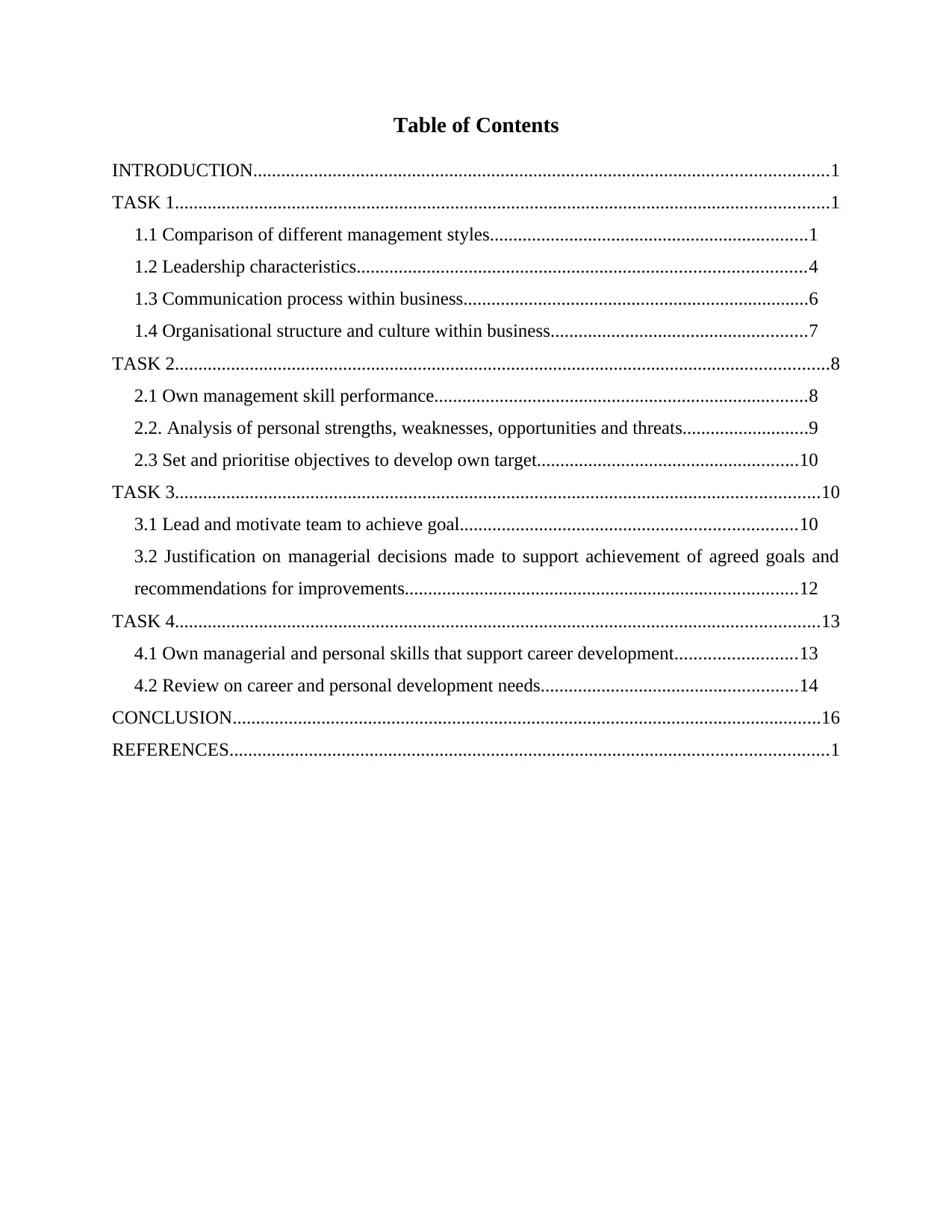
Table of Contents
INTRODUCTION...........................................................................................................................1
TASK 1............................................................................................................................................1
1.1 Comparison of different management styles....................................................................1
1.2 Leadership characteristics................................................................................................4
1.3 Communication process within business..........................................................................6
1.4 Organisational structure and culture within business.......................................................7
TASK 2............................................................................................................................................8
2.1 Own management skill performance................................................................................8
2.2. Analysis of personal strengths, weaknesses, opportunities and threats...........................9
2.3 Set and prioritise objectives to develop own target........................................................10
TASK 3..........................................................................................................................................10
3.1 Lead and motivate team to achieve goal........................................................................10
3.2 Justification on managerial decisions made to support achievement of agreed goals and
recommendations for improvements....................................................................................12
TASK 4..........................................................................................................................................13
4.1 Own managerial and personal skills that support career development..........................13
4.2 Review on career and personal development needs.......................................................14
CONCLUSION..............................................................................................................................16
REFERENCES................................................................................................................................1
INTRODUCTION...........................................................................................................................1
TASK 1............................................................................................................................................1
1.1 Comparison of different management styles....................................................................1
1.2 Leadership characteristics................................................................................................4
1.3 Communication process within business..........................................................................6
1.4 Organisational structure and culture within business.......................................................7
TASK 2............................................................................................................................................8
2.1 Own management skill performance................................................................................8
2.2. Analysis of personal strengths, weaknesses, opportunities and threats...........................9
2.3 Set and prioritise objectives to develop own target........................................................10
TASK 3..........................................................................................................................................10
3.1 Lead and motivate team to achieve goal........................................................................10
3.2 Justification on managerial decisions made to support achievement of agreed goals and
recommendations for improvements....................................................................................12
TASK 4..........................................................................................................................................13
4.1 Own managerial and personal skills that support career development..........................13
4.2 Review on career and personal development needs.......................................................14
CONCLUSION..............................................................................................................................16
REFERENCES................................................................................................................................1
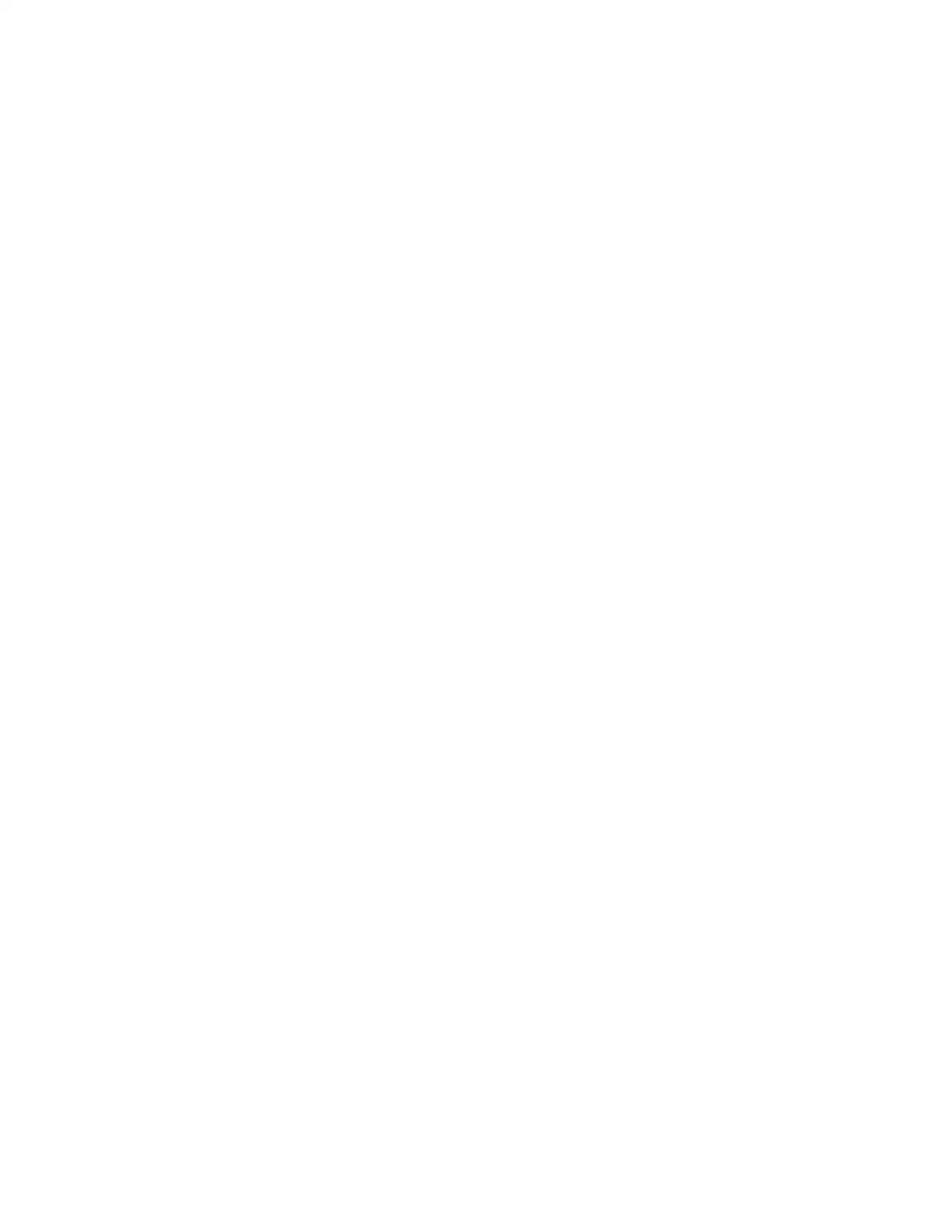
⊘ This is a preview!⊘
Do you want full access?
Subscribe today to unlock all pages.

Trusted by 1+ million students worldwide
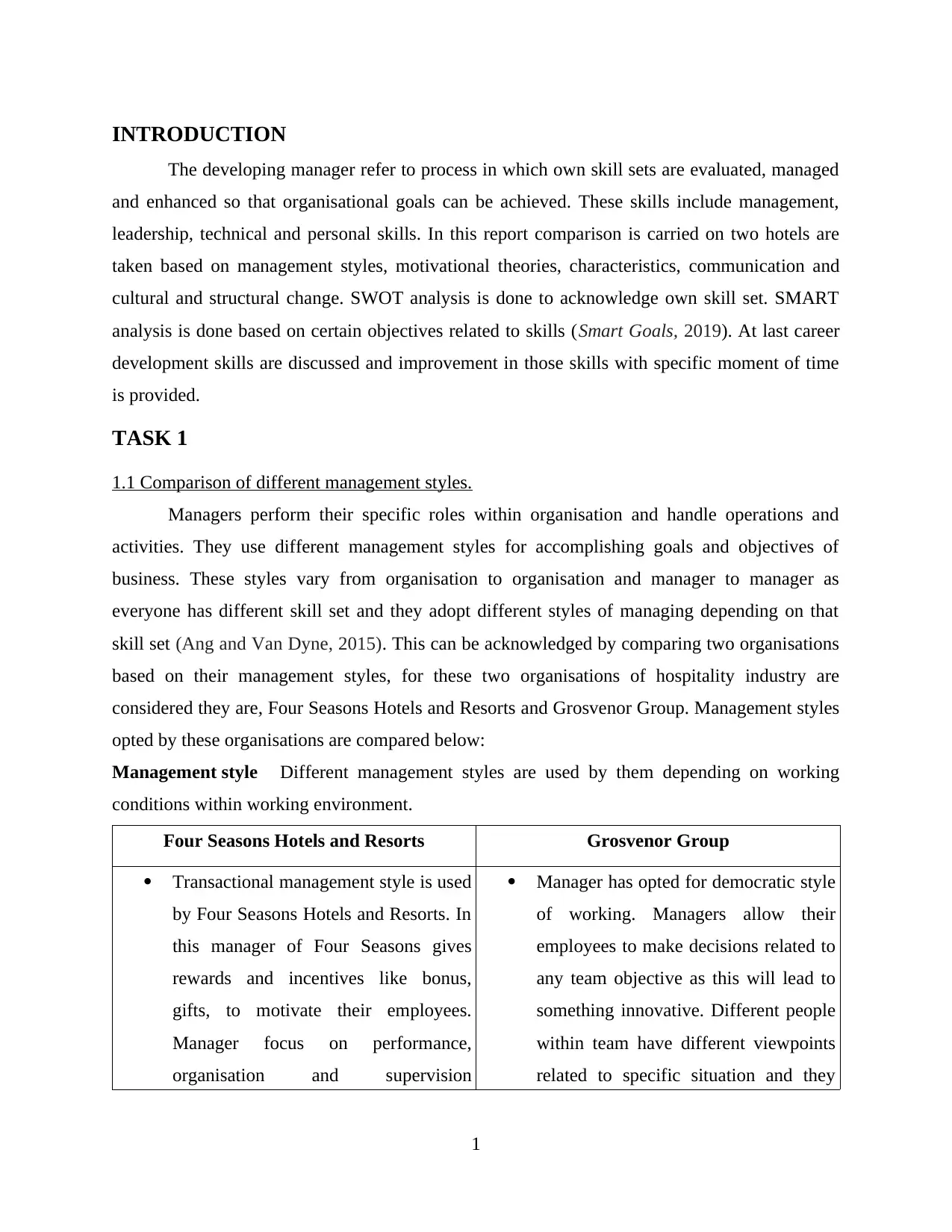
INTRODUCTION
The developing manager refer to process in which own skill sets are evaluated, managed
and enhanced so that organisational goals can be achieved. These skills include management,
leadership, technical and personal skills. In this report comparison is carried on two hotels are
taken based on management styles, motivational theories, characteristics, communication and
cultural and structural change. SWOT analysis is done to acknowledge own skill set. SMART
analysis is done based on certain objectives related to skills (Smart Goals, 2019). At last career
development skills are discussed and improvement in those skills with specific moment of time
is provided.
TASK 1
1.1 Comparison of different management styles.
Managers perform their specific roles within organisation and handle operations and
activities. They use different management styles for accomplishing goals and objectives of
business. These styles vary from organisation to organisation and manager to manager as
everyone has different skill set and they adopt different styles of managing depending on that
skill set (Ang and Van Dyne, 2015). This can be acknowledged by comparing two organisations
based on their management styles, for these two organisations of hospitality industry are
considered they are, Four Seasons Hotels and Resorts and Grosvenor Group. Management styles
opted by these organisations are compared below:
Management style Different management styles are used by them depending on working
conditions within working environment.
Four Seasons Hotels and Resorts Grosvenor Group
Transactional management style is used
by Four Seasons Hotels and Resorts. In
this manager of Four Seasons gives
rewards and incentives like bonus,
gifts, to motivate their employees.
Manager focus on performance,
organisation and supervision
Manager has opted for democratic style
of working. Managers allow their
employees to make decisions related to
any team objective as this will lead to
something innovative. Different people
within team have different viewpoints
related to specific situation and they
1
The developing manager refer to process in which own skill sets are evaluated, managed
and enhanced so that organisational goals can be achieved. These skills include management,
leadership, technical and personal skills. In this report comparison is carried on two hotels are
taken based on management styles, motivational theories, characteristics, communication and
cultural and structural change. SWOT analysis is done to acknowledge own skill set. SMART
analysis is done based on certain objectives related to skills (Smart Goals, 2019). At last career
development skills are discussed and improvement in those skills with specific moment of time
is provided.
TASK 1
1.1 Comparison of different management styles.
Managers perform their specific roles within organisation and handle operations and
activities. They use different management styles for accomplishing goals and objectives of
business. These styles vary from organisation to organisation and manager to manager as
everyone has different skill set and they adopt different styles of managing depending on that
skill set (Ang and Van Dyne, 2015). This can be acknowledged by comparing two organisations
based on their management styles, for these two organisations of hospitality industry are
considered they are, Four Seasons Hotels and Resorts and Grosvenor Group. Management styles
opted by these organisations are compared below:
Management style Different management styles are used by them depending on working
conditions within working environment.
Four Seasons Hotels and Resorts Grosvenor Group
Transactional management style is used
by Four Seasons Hotels and Resorts. In
this manager of Four Seasons gives
rewards and incentives like bonus,
gifts, to motivate their employees.
Manager focus on performance,
organisation and supervision
Manager has opted for democratic style
of working. Managers allow their
employees to make decisions related to
any team objective as this will lead to
something innovative. Different people
within team have different viewpoints
related to specific situation and they
1
Paraphrase This Document
Need a fresh take? Get an instant paraphrase of this document with our AI Paraphraser
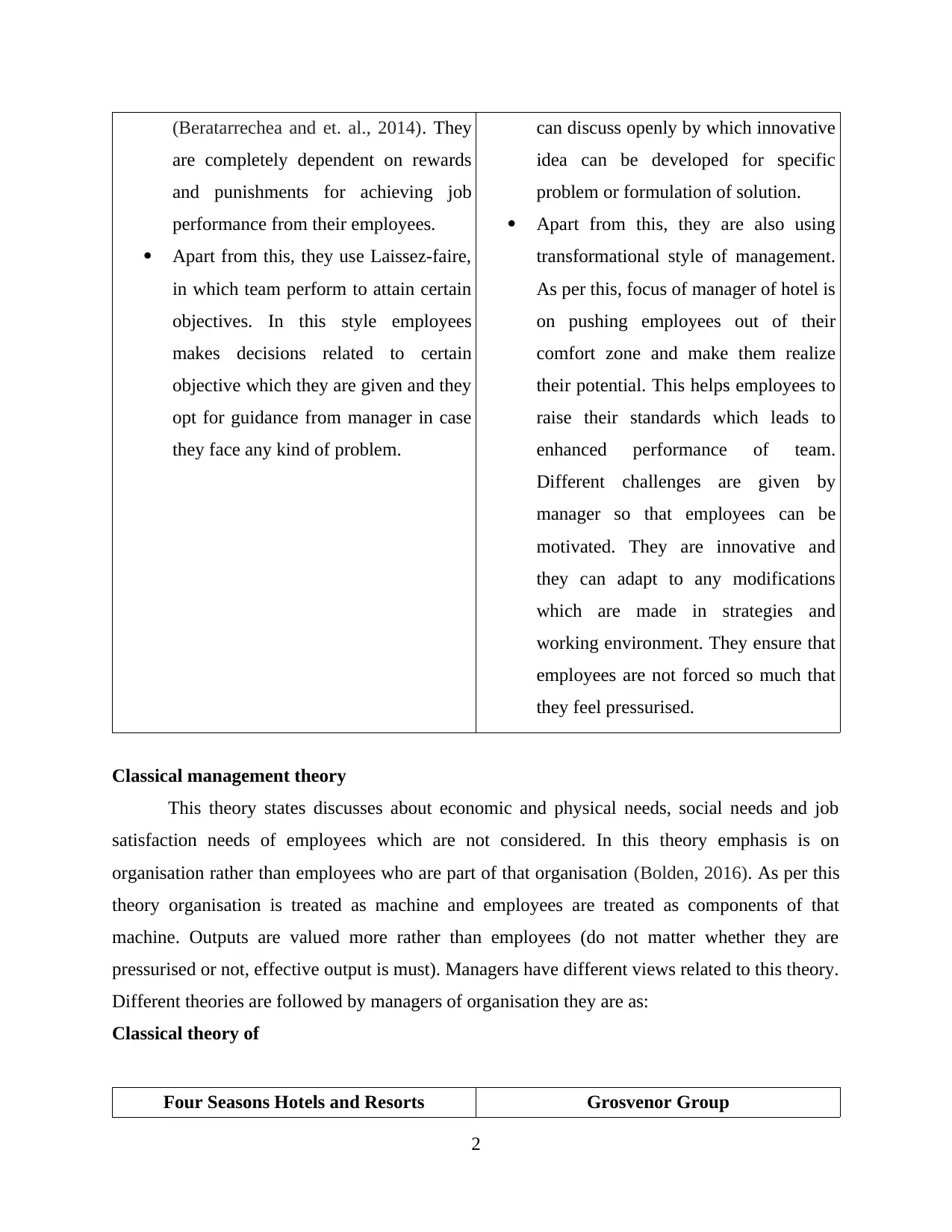
(Beratarrechea and et. al., 2014). They
are completely dependent on rewards
and punishments for achieving job
performance from their employees.
Apart from this, they use Laissez-faire,
in which team perform to attain certain
objectives. In this style employees
makes decisions related to certain
objective which they are given and they
opt for guidance from manager in case
they face any kind of problem.
can discuss openly by which innovative
idea can be developed for specific
problem or formulation of solution.
Apart from this, they are also using
transformational style of management.
As per this, focus of manager of hotel is
on pushing employees out of their
comfort zone and make them realize
their potential. This helps employees to
raise their standards which leads to
enhanced performance of team.
Different challenges are given by
manager so that employees can be
motivated. They are innovative and
they can adapt to any modifications
which are made in strategies and
working environment. They ensure that
employees are not forced so much that
they feel pressurised.
Classical management theory
This theory states discusses about economic and physical needs, social needs and job
satisfaction needs of employees which are not considered. In this theory emphasis is on
organisation rather than employees who are part of that organisation (Bolden, 2016). As per this
theory organisation is treated as machine and employees are treated as components of that
machine. Outputs are valued more rather than employees (do not matter whether they are
pressurised or not, effective output is must). Managers have different views related to this theory.
Different theories are followed by managers of organisation they are as:
Classical theory of
Four Seasons Hotels and Resorts Grosvenor Group
2
are completely dependent on rewards
and punishments for achieving job
performance from their employees.
Apart from this, they use Laissez-faire,
in which team perform to attain certain
objectives. In this style employees
makes decisions related to certain
objective which they are given and they
opt for guidance from manager in case
they face any kind of problem.
can discuss openly by which innovative
idea can be developed for specific
problem or formulation of solution.
Apart from this, they are also using
transformational style of management.
As per this, focus of manager of hotel is
on pushing employees out of their
comfort zone and make them realize
their potential. This helps employees to
raise their standards which leads to
enhanced performance of team.
Different challenges are given by
manager so that employees can be
motivated. They are innovative and
they can adapt to any modifications
which are made in strategies and
working environment. They ensure that
employees are not forced so much that
they feel pressurised.
Classical management theory
This theory states discusses about economic and physical needs, social needs and job
satisfaction needs of employees which are not considered. In this theory emphasis is on
organisation rather than employees who are part of that organisation (Bolden, 2016). As per this
theory organisation is treated as machine and employees are treated as components of that
machine. Outputs are valued more rather than employees (do not matter whether they are
pressurised or not, effective output is must). Managers have different views related to this theory.
Different theories are followed by managers of organisation they are as:
Classical theory of
Four Seasons Hotels and Resorts Grosvenor Group
2
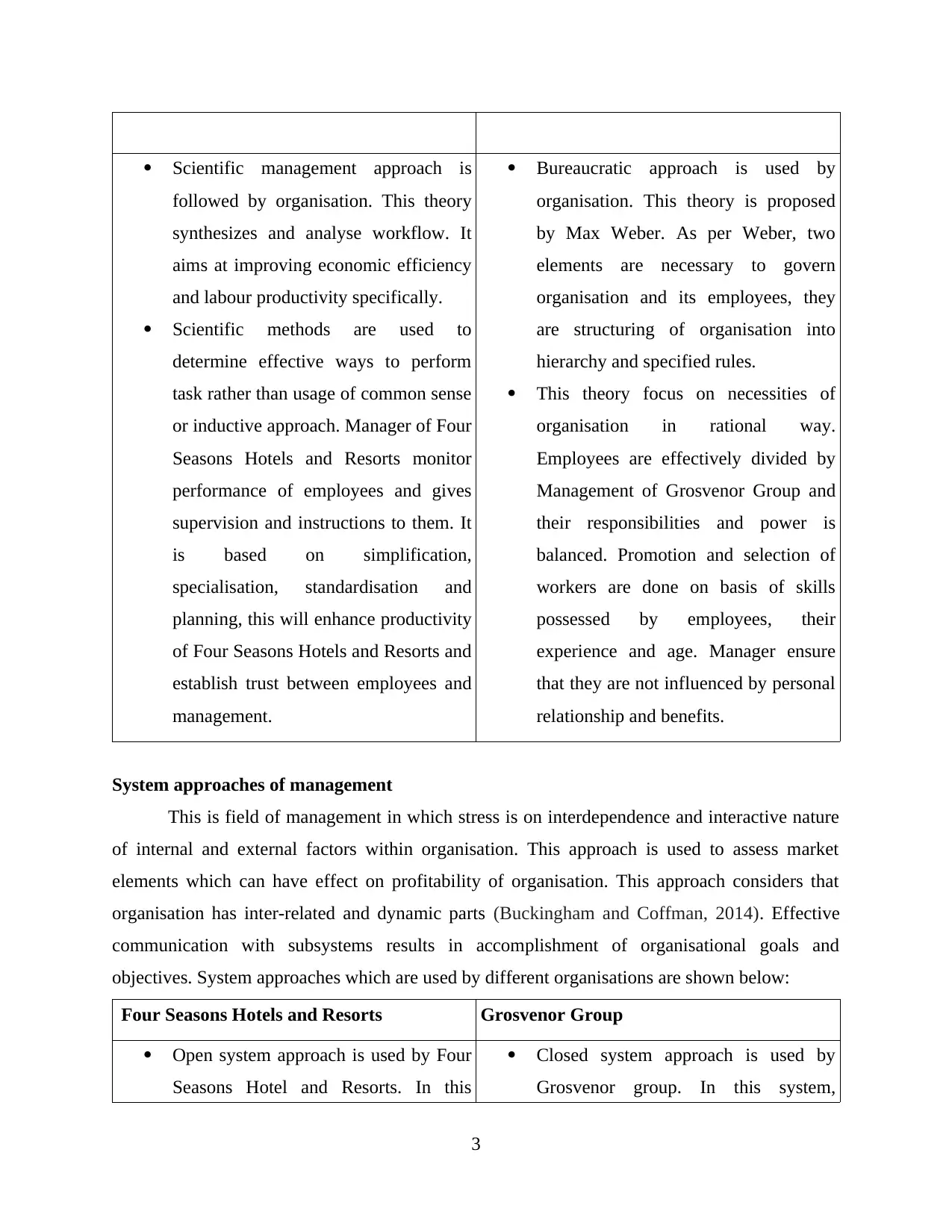
Scientific management approach is
followed by organisation. This theory
synthesizes and analyse workflow. It
aims at improving economic efficiency
and labour productivity specifically.
Scientific methods are used to
determine effective ways to perform
task rather than usage of common sense
or inductive approach. Manager of Four
Seasons Hotels and Resorts monitor
performance of employees and gives
supervision and instructions to them. It
is based on simplification,
specialisation, standardisation and
planning, this will enhance productivity
of Four Seasons Hotels and Resorts and
establish trust between employees and
management.
Bureaucratic approach is used by
organisation. This theory is proposed
by Max Weber. As per Weber, two
elements are necessary to govern
organisation and its employees, they
are structuring of organisation into
hierarchy and specified rules.
This theory focus on necessities of
organisation in rational way.
Employees are effectively divided by
Management of Grosvenor Group and
their responsibilities and power is
balanced. Promotion and selection of
workers are done on basis of skills
possessed by employees, their
experience and age. Manager ensure
that they are not influenced by personal
relationship and benefits.
System approaches of management
This is field of management in which stress is on interdependence and interactive nature
of internal and external factors within organisation. This approach is used to assess market
elements which can have effect on profitability of organisation. This approach considers that
organisation has inter-related and dynamic parts (Buckingham and Coffman, 2014). Effective
communication with subsystems results in accomplishment of organisational goals and
objectives. System approaches which are used by different organisations are shown below:
Four Seasons Hotels and Resorts Grosvenor Group
Open system approach is used by Four
Seasons Hotel and Resorts. In this
Closed system approach is used by
Grosvenor group. In this system,
3
followed by organisation. This theory
synthesizes and analyse workflow. It
aims at improving economic efficiency
and labour productivity specifically.
Scientific methods are used to
determine effective ways to perform
task rather than usage of common sense
or inductive approach. Manager of Four
Seasons Hotels and Resorts monitor
performance of employees and gives
supervision and instructions to them. It
is based on simplification,
specialisation, standardisation and
planning, this will enhance productivity
of Four Seasons Hotels and Resorts and
establish trust between employees and
management.
Bureaucratic approach is used by
organisation. This theory is proposed
by Max Weber. As per Weber, two
elements are necessary to govern
organisation and its employees, they
are structuring of organisation into
hierarchy and specified rules.
This theory focus on necessities of
organisation in rational way.
Employees are effectively divided by
Management of Grosvenor Group and
their responsibilities and power is
balanced. Promotion and selection of
workers are done on basis of skills
possessed by employees, their
experience and age. Manager ensure
that they are not influenced by personal
relationship and benefits.
System approaches of management
This is field of management in which stress is on interdependence and interactive nature
of internal and external factors within organisation. This approach is used to assess market
elements which can have effect on profitability of organisation. This approach considers that
organisation has inter-related and dynamic parts (Buckingham and Coffman, 2014). Effective
communication with subsystems results in accomplishment of organisational goals and
objectives. System approaches which are used by different organisations are shown below:
Four Seasons Hotels and Resorts Grosvenor Group
Open system approach is used by Four
Seasons Hotel and Resorts. In this
Closed system approach is used by
Grosvenor group. In this system,
3
⊘ This is a preview!⊘
Do you want full access?
Subscribe today to unlock all pages.

Trusted by 1+ million students worldwide
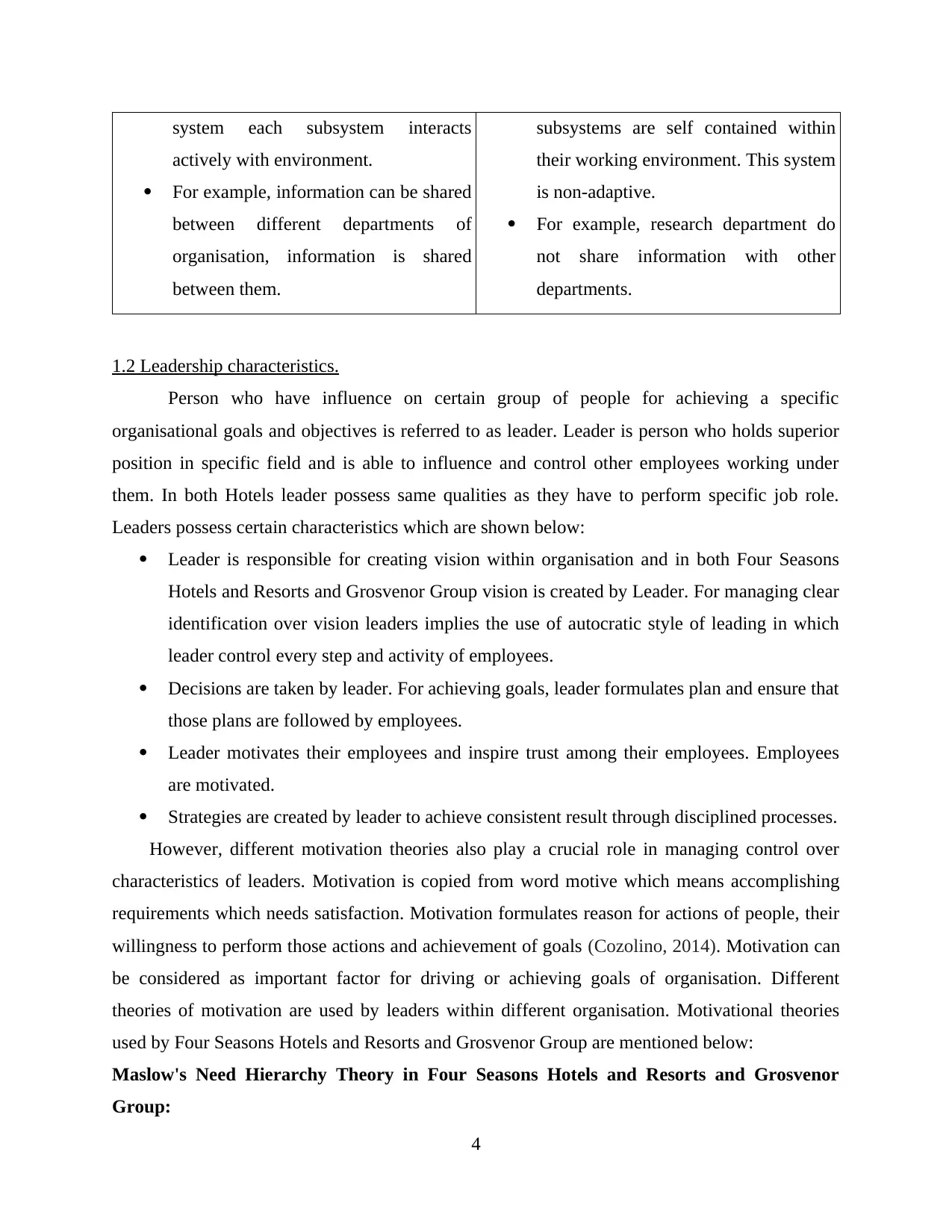
system each subsystem interacts
actively with environment.
For example, information can be shared
between different departments of
organisation, information is shared
between them.
subsystems are self contained within
their working environment. This system
is non-adaptive.
For example, research department do
not share information with other
departments.
1.2 Leadership characteristics.
Person who have influence on certain group of people for achieving a specific
organisational goals and objectives is referred to as leader. Leader is person who holds superior
position in specific field and is able to influence and control other employees working under
them. In both Hotels leader possess same qualities as they have to perform specific job role.
Leaders possess certain characteristics which are shown below:
Leader is responsible for creating vision within organisation and in both Four Seasons
Hotels and Resorts and Grosvenor Group vision is created by Leader. For managing clear
identification over vision leaders implies the use of autocratic style of leading in which
leader control every step and activity of employees.
Decisions are taken by leader. For achieving goals, leader formulates plan and ensure that
those plans are followed by employees.
Leader motivates their employees and inspire trust among their employees. Employees
are motivated.
Strategies are created by leader to achieve consistent result through disciplined processes.
However, different motivation theories also play a crucial role in managing control over
characteristics of leaders. Motivation is copied from word motive which means accomplishing
requirements which needs satisfaction. Motivation formulates reason for actions of people, their
willingness to perform those actions and achievement of goals (Cozolino, 2014). Motivation can
be considered as important factor for driving or achieving goals of organisation. Different
theories of motivation are used by leaders within different organisation. Motivational theories
used by Four Seasons Hotels and Resorts and Grosvenor Group are mentioned below:
Maslow's Need Hierarchy Theory in Four Seasons Hotels and Resorts and Grosvenor
Group:
4
actively with environment.
For example, information can be shared
between different departments of
organisation, information is shared
between them.
subsystems are self contained within
their working environment. This system
is non-adaptive.
For example, research department do
not share information with other
departments.
1.2 Leadership characteristics.
Person who have influence on certain group of people for achieving a specific
organisational goals and objectives is referred to as leader. Leader is person who holds superior
position in specific field and is able to influence and control other employees working under
them. In both Hotels leader possess same qualities as they have to perform specific job role.
Leaders possess certain characteristics which are shown below:
Leader is responsible for creating vision within organisation and in both Four Seasons
Hotels and Resorts and Grosvenor Group vision is created by Leader. For managing clear
identification over vision leaders implies the use of autocratic style of leading in which
leader control every step and activity of employees.
Decisions are taken by leader. For achieving goals, leader formulates plan and ensure that
those plans are followed by employees.
Leader motivates their employees and inspire trust among their employees. Employees
are motivated.
Strategies are created by leader to achieve consistent result through disciplined processes.
However, different motivation theories also play a crucial role in managing control over
characteristics of leaders. Motivation is copied from word motive which means accomplishing
requirements which needs satisfaction. Motivation formulates reason for actions of people, their
willingness to perform those actions and achievement of goals (Cozolino, 2014). Motivation can
be considered as important factor for driving or achieving goals of organisation. Different
theories of motivation are used by leaders within different organisation. Motivational theories
used by Four Seasons Hotels and Resorts and Grosvenor Group are mentioned below:
Maslow's Need Hierarchy Theory in Four Seasons Hotels and Resorts and Grosvenor
Group:
4
Paraphrase This Document
Need a fresh take? Get an instant paraphrase of this document with our AI Paraphraser
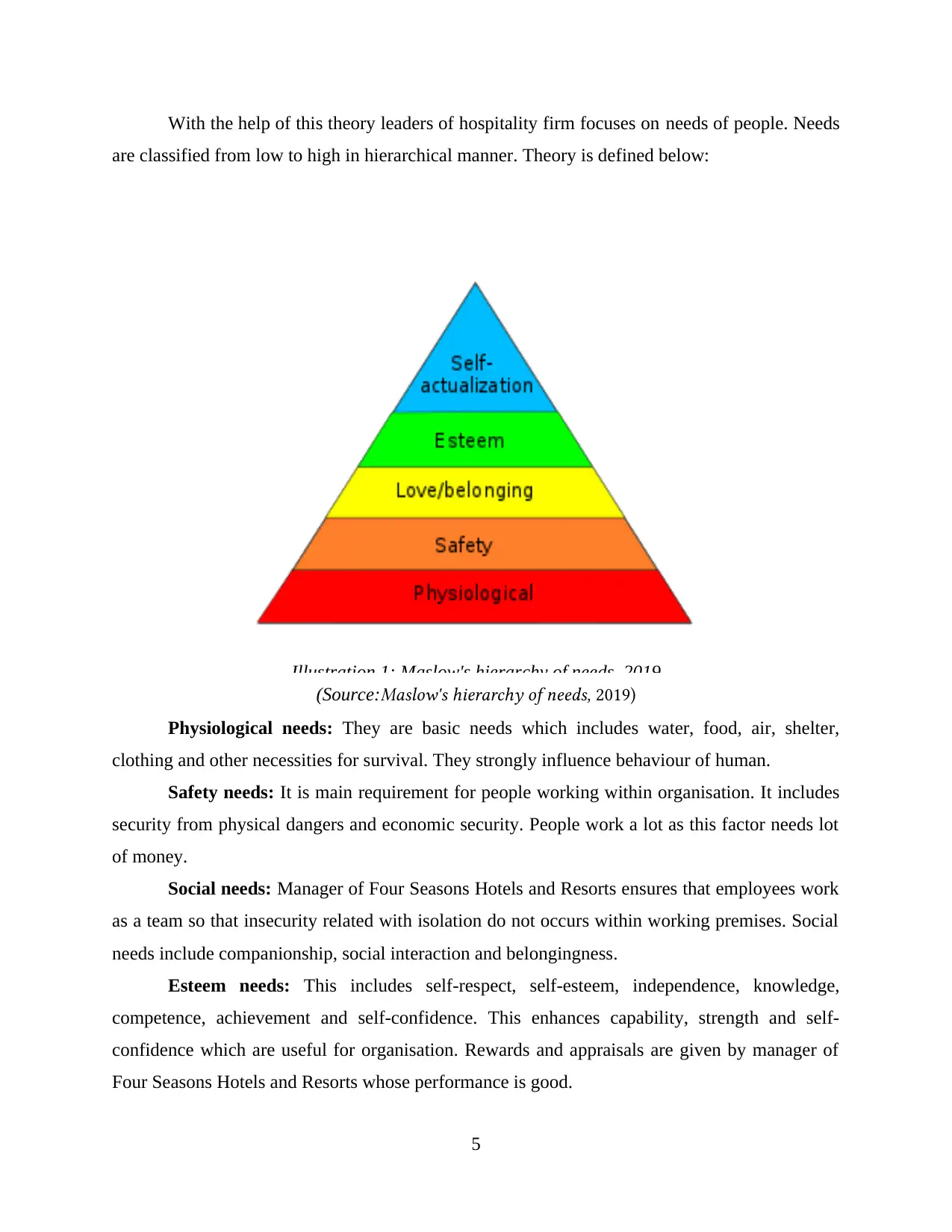
With the help of this theory leaders of hospitality firm focuses on needs of people. Needs
are classified from low to high in hierarchical manner. Theory is defined below:
(Source:Maslow's hierarchy of needs, 2019)
Physiological needs: They are basic needs which includes water, food, air, shelter,
clothing and other necessities for survival. They strongly influence behaviour of human.
Safety needs: It is main requirement for people working within organisation. It includes
security from physical dangers and economic security. People work a lot as this factor needs lot
of money.
Social needs: Manager of Four Seasons Hotels and Resorts ensures that employees work
as a team so that insecurity related with isolation do not occurs within working premises. Social
needs include companionship, social interaction and belongingness.
Esteem needs: This includes self-respect, self-esteem, independence, knowledge,
competence, achievement and self-confidence. This enhances capability, strength and self-
confidence which are useful for organisation. Rewards and appraisals are given by manager of
Four Seasons Hotels and Resorts whose performance is good.
5
Illustration 1: Maslow's hierarchy of needs, 2019
are classified from low to high in hierarchical manner. Theory is defined below:
(Source:Maslow's hierarchy of needs, 2019)
Physiological needs: They are basic needs which includes water, food, air, shelter,
clothing and other necessities for survival. They strongly influence behaviour of human.
Safety needs: It is main requirement for people working within organisation. It includes
security from physical dangers and economic security. People work a lot as this factor needs lot
of money.
Social needs: Manager of Four Seasons Hotels and Resorts ensures that employees work
as a team so that insecurity related with isolation do not occurs within working premises. Social
needs include companionship, social interaction and belongingness.
Esteem needs: This includes self-respect, self-esteem, independence, knowledge,
competence, achievement and self-confidence. This enhances capability, strength and self-
confidence which are useful for organisation. Rewards and appraisals are given by manager of
Four Seasons Hotels and Resorts whose performance is good.
5
Illustration 1: Maslow's hierarchy of needs, 2019
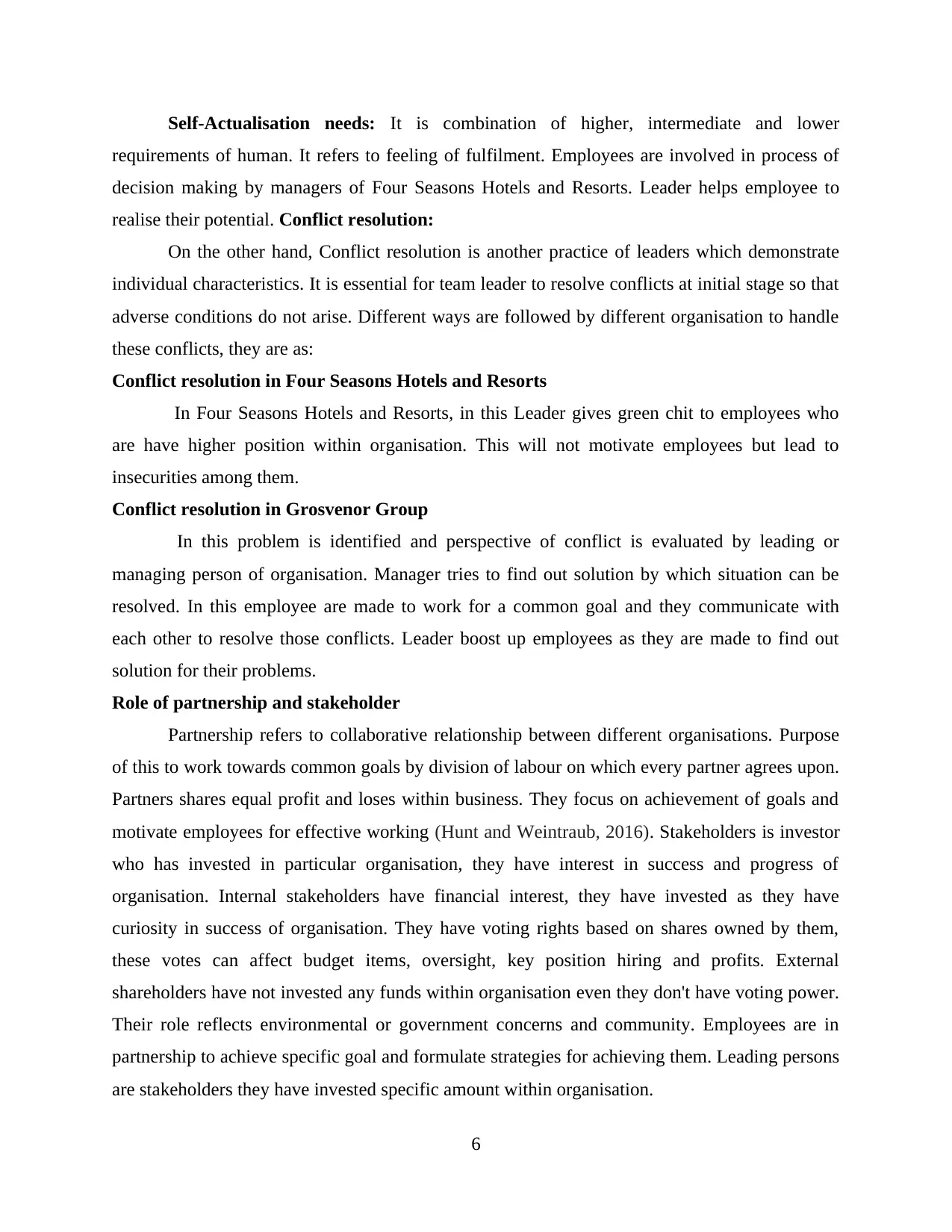
Self-Actualisation needs: It is combination of higher, intermediate and lower
requirements of human. It refers to feeling of fulfilment. Employees are involved in process of
decision making by managers of Four Seasons Hotels and Resorts. Leader helps employee to
realise their potential. Conflict resolution:
On the other hand, Conflict resolution is another practice of leaders which demonstrate
individual characteristics. It is essential for team leader to resolve conflicts at initial stage so that
adverse conditions do not arise. Different ways are followed by different organisation to handle
these conflicts, they are as:
Conflict resolution in Four Seasons Hotels and Resorts
In Four Seasons Hotels and Resorts, in this Leader gives green chit to employees who
are have higher position within organisation. This will not motivate employees but lead to
insecurities among them.
Conflict resolution in Grosvenor Group
In this problem is identified and perspective of conflict is evaluated by leading or
managing person of organisation. Manager tries to find out solution by which situation can be
resolved. In this employee are made to work for a common goal and they communicate with
each other to resolve those conflicts. Leader boost up employees as they are made to find out
solution for their problems.
Role of partnership and stakeholder
Partnership refers to collaborative relationship between different organisations. Purpose
of this to work towards common goals by division of labour on which every partner agrees upon.
Partners shares equal profit and loses within business. They focus on achievement of goals and
motivate employees for effective working (Hunt and Weintraub, 2016). Stakeholders is investor
who has invested in particular organisation, they have interest in success and progress of
organisation. Internal stakeholders have financial interest, they have invested as they have
curiosity in success of organisation. They have voting rights based on shares owned by them,
these votes can affect budget items, oversight, key position hiring and profits. External
shareholders have not invested any funds within organisation even they don't have voting power.
Their role reflects environmental or government concerns and community. Employees are in
partnership to achieve specific goal and formulate strategies for achieving them. Leading persons
are stakeholders they have invested specific amount within organisation.
6
requirements of human. It refers to feeling of fulfilment. Employees are involved in process of
decision making by managers of Four Seasons Hotels and Resorts. Leader helps employee to
realise their potential. Conflict resolution:
On the other hand, Conflict resolution is another practice of leaders which demonstrate
individual characteristics. It is essential for team leader to resolve conflicts at initial stage so that
adverse conditions do not arise. Different ways are followed by different organisation to handle
these conflicts, they are as:
Conflict resolution in Four Seasons Hotels and Resorts
In Four Seasons Hotels and Resorts, in this Leader gives green chit to employees who
are have higher position within organisation. This will not motivate employees but lead to
insecurities among them.
Conflict resolution in Grosvenor Group
In this problem is identified and perspective of conflict is evaluated by leading or
managing person of organisation. Manager tries to find out solution by which situation can be
resolved. In this employee are made to work for a common goal and they communicate with
each other to resolve those conflicts. Leader boost up employees as they are made to find out
solution for their problems.
Role of partnership and stakeholder
Partnership refers to collaborative relationship between different organisations. Purpose
of this to work towards common goals by division of labour on which every partner agrees upon.
Partners shares equal profit and loses within business. They focus on achievement of goals and
motivate employees for effective working (Hunt and Weintraub, 2016). Stakeholders is investor
who has invested in particular organisation, they have interest in success and progress of
organisation. Internal stakeholders have financial interest, they have invested as they have
curiosity in success of organisation. They have voting rights based on shares owned by them,
these votes can affect budget items, oversight, key position hiring and profits. External
shareholders have not invested any funds within organisation even they don't have voting power.
Their role reflects environmental or government concerns and community. Employees are in
partnership to achieve specific goal and formulate strategies for achieving them. Leading persons
are stakeholders they have invested specific amount within organisation.
6
⊘ This is a preview!⊘
Do you want full access?
Subscribe today to unlock all pages.

Trusted by 1+ million students worldwide
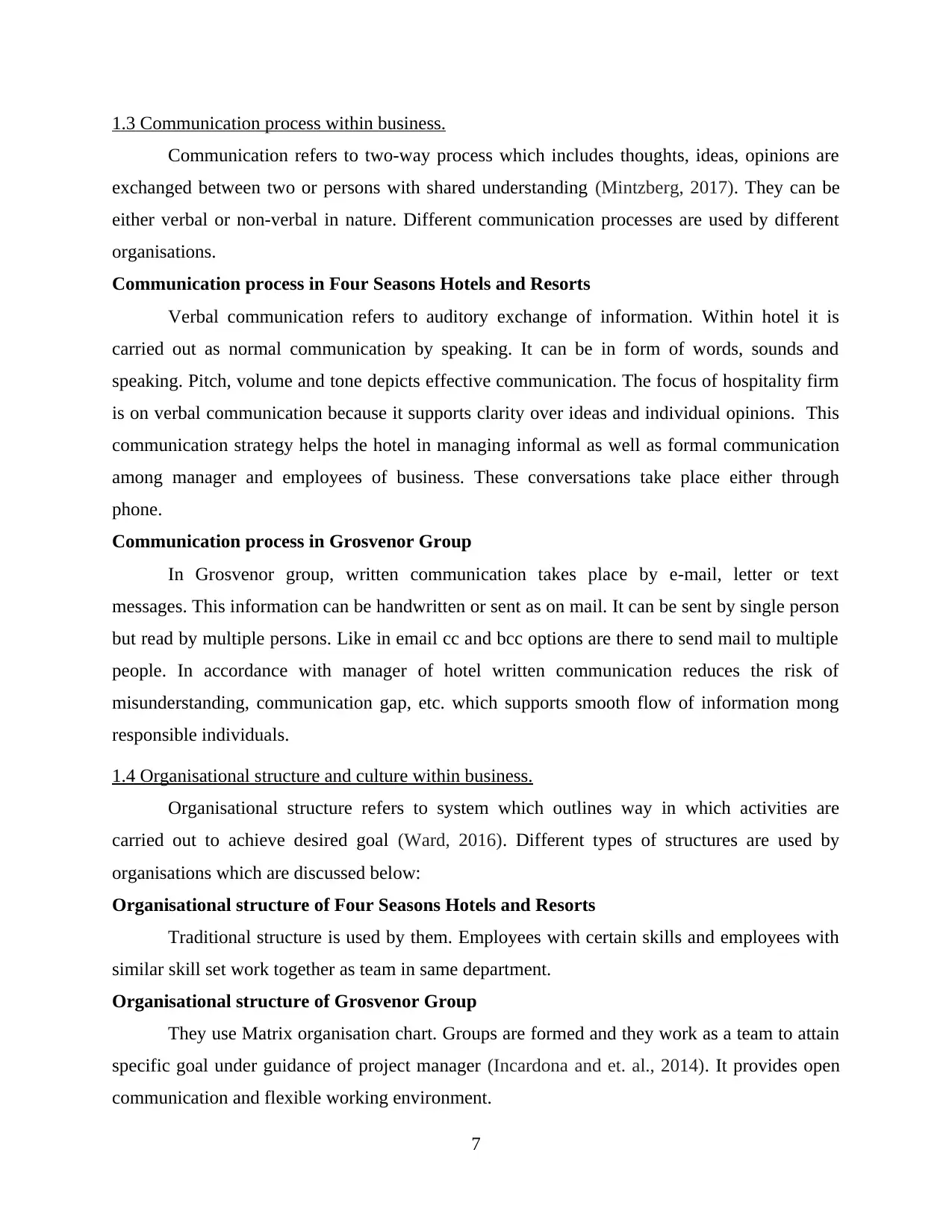
1.3 Communication process within business.
Communication refers to two-way process which includes thoughts, ideas, opinions are
exchanged between two or persons with shared understanding (Mintzberg, 2017). They can be
either verbal or non-verbal in nature. Different communication processes are used by different
organisations.
Communication process in Four Seasons Hotels and Resorts
Verbal communication refers to auditory exchange of information. Within hotel it is
carried out as normal communication by speaking. It can be in form of words, sounds and
speaking. Pitch, volume and tone depicts effective communication. The focus of hospitality firm
is on verbal communication because it supports clarity over ideas and individual opinions. This
communication strategy helps the hotel in managing informal as well as formal communication
among manager and employees of business. These conversations take place either through
phone.
Communication process in Grosvenor Group
In Grosvenor group, written communication takes place by e-mail, letter or text
messages. This information can be handwritten or sent as on mail. It can be sent by single person
but read by multiple persons. Like in email cc and bcc options are there to send mail to multiple
people. In accordance with manager of hotel written communication reduces the risk of
misunderstanding, communication gap, etc. which supports smooth flow of information mong
responsible individuals.
1.4 Organisational structure and culture within business.
Organisational structure refers to system which outlines way in which activities are
carried out to achieve desired goal (Ward, 2016). Different types of structures are used by
organisations which are discussed below:
Organisational structure of Four Seasons Hotels and Resorts
Traditional structure is used by them. Employees with certain skills and employees with
similar skill set work together as team in same department.
Organisational structure of Grosvenor Group
They use Matrix organisation chart. Groups are formed and they work as a team to attain
specific goal under guidance of project manager (Incardona and et. al., 2014). It provides open
communication and flexible working environment.
7
Communication refers to two-way process which includes thoughts, ideas, opinions are
exchanged between two or persons with shared understanding (Mintzberg, 2017). They can be
either verbal or non-verbal in nature. Different communication processes are used by different
organisations.
Communication process in Four Seasons Hotels and Resorts
Verbal communication refers to auditory exchange of information. Within hotel it is
carried out as normal communication by speaking. It can be in form of words, sounds and
speaking. Pitch, volume and tone depicts effective communication. The focus of hospitality firm
is on verbal communication because it supports clarity over ideas and individual opinions. This
communication strategy helps the hotel in managing informal as well as formal communication
among manager and employees of business. These conversations take place either through
phone.
Communication process in Grosvenor Group
In Grosvenor group, written communication takes place by e-mail, letter or text
messages. This information can be handwritten or sent as on mail. It can be sent by single person
but read by multiple persons. Like in email cc and bcc options are there to send mail to multiple
people. In accordance with manager of hotel written communication reduces the risk of
misunderstanding, communication gap, etc. which supports smooth flow of information mong
responsible individuals.
1.4 Organisational structure and culture within business.
Organisational structure refers to system which outlines way in which activities are
carried out to achieve desired goal (Ward, 2016). Different types of structures are used by
organisations which are discussed below:
Organisational structure of Four Seasons Hotels and Resorts
Traditional structure is used by them. Employees with certain skills and employees with
similar skill set work together as team in same department.
Organisational structure of Grosvenor Group
They use Matrix organisation chart. Groups are formed and they work as a team to attain
specific goal under guidance of project manager (Incardona and et. al., 2014). It provides open
communication and flexible working environment.
7
Paraphrase This Document
Need a fresh take? Get an instant paraphrase of this document with our AI Paraphraser
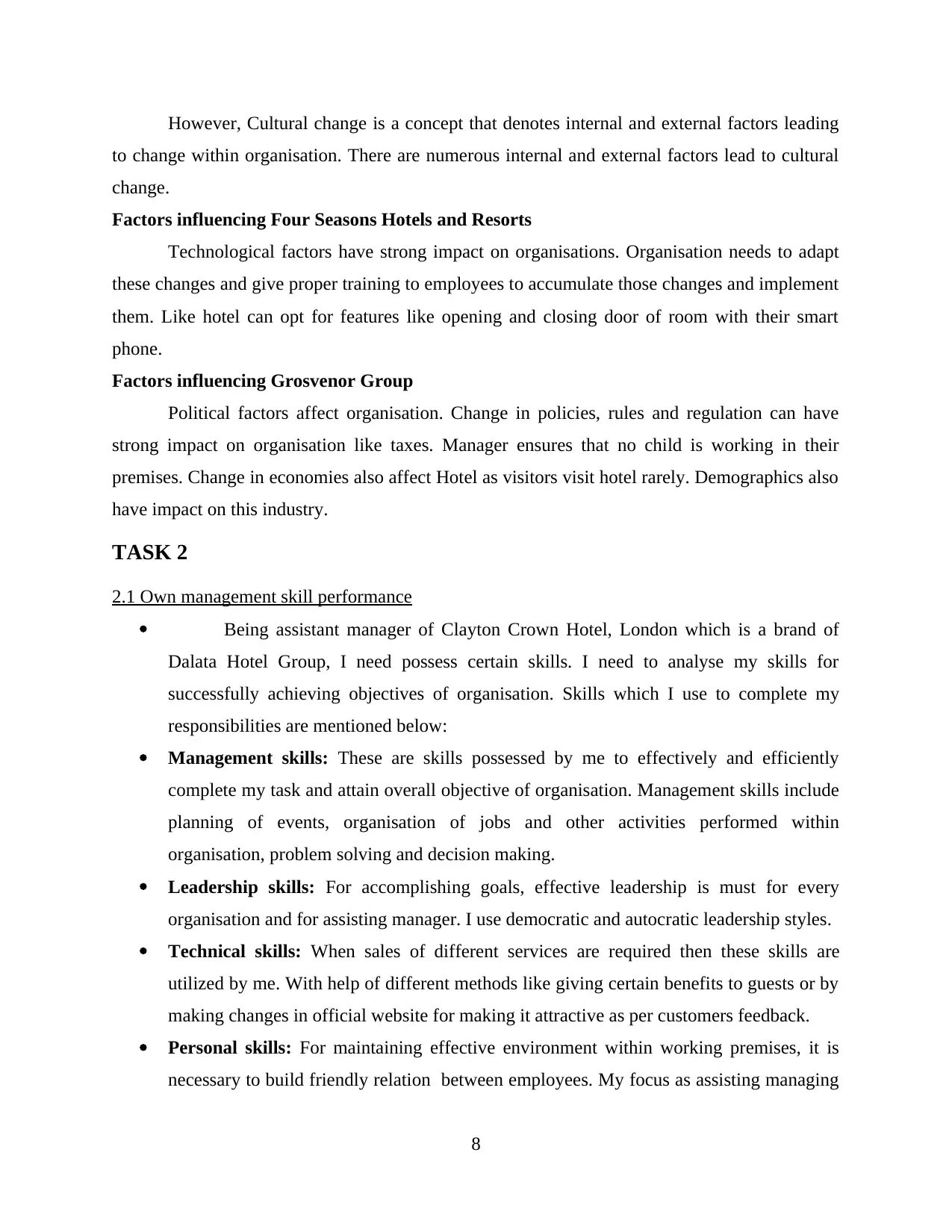
However, Cultural change is a concept that denotes internal and external factors leading
to change within organisation. There are numerous internal and external factors lead to cultural
change.
Factors influencing Four Seasons Hotels and Resorts
Technological factors have strong impact on organisations. Organisation needs to adapt
these changes and give proper training to employees to accumulate those changes and implement
them. Like hotel can opt for features like opening and closing door of room with their smart
phone.
Factors influencing Grosvenor Group
Political factors affect organisation. Change in policies, rules and regulation can have
strong impact on organisation like taxes. Manager ensures that no child is working in their
premises. Change in economies also affect Hotel as visitors visit hotel rarely. Demographics also
have impact on this industry.
TASK 2
2.1 Own management skill performance
Being assistant manager of Clayton Crown Hotel, London which is a brand of
Dalata Hotel Group, I need possess certain skills. I need to analyse my skills for
successfully achieving objectives of organisation. Skills which I use to complete my
responsibilities are mentioned below:
Management skills: These are skills possessed by me to effectively and efficiently
complete my task and attain overall objective of organisation. Management skills include
planning of events, organisation of jobs and other activities performed within
organisation, problem solving and decision making.
Leadership skills: For accomplishing goals, effective leadership is must for every
organisation and for assisting manager. I use democratic and autocratic leadership styles.
Technical skills: When sales of different services are required then these skills are
utilized by me. With help of different methods like giving certain benefits to guests or by
making changes in official website for making it attractive as per customers feedback.
Personal skills: For maintaining effective environment within working premises, it is
necessary to build friendly relation between employees. My focus as assisting managing
8
to change within organisation. There are numerous internal and external factors lead to cultural
change.
Factors influencing Four Seasons Hotels and Resorts
Technological factors have strong impact on organisations. Organisation needs to adapt
these changes and give proper training to employees to accumulate those changes and implement
them. Like hotel can opt for features like opening and closing door of room with their smart
phone.
Factors influencing Grosvenor Group
Political factors affect organisation. Change in policies, rules and regulation can have
strong impact on organisation like taxes. Manager ensures that no child is working in their
premises. Change in economies also affect Hotel as visitors visit hotel rarely. Demographics also
have impact on this industry.
TASK 2
2.1 Own management skill performance
Being assistant manager of Clayton Crown Hotel, London which is a brand of
Dalata Hotel Group, I need possess certain skills. I need to analyse my skills for
successfully achieving objectives of organisation. Skills which I use to complete my
responsibilities are mentioned below:
Management skills: These are skills possessed by me to effectively and efficiently
complete my task and attain overall objective of organisation. Management skills include
planning of events, organisation of jobs and other activities performed within
organisation, problem solving and decision making.
Leadership skills: For accomplishing goals, effective leadership is must for every
organisation and for assisting manager. I use democratic and autocratic leadership styles.
Technical skills: When sales of different services are required then these skills are
utilized by me. With help of different methods like giving certain benefits to guests or by
making changes in official website for making it attractive as per customers feedback.
Personal skills: For maintaining effective environment within working premises, it is
necessary to build friendly relation between employees. My focus as assisting managing
8
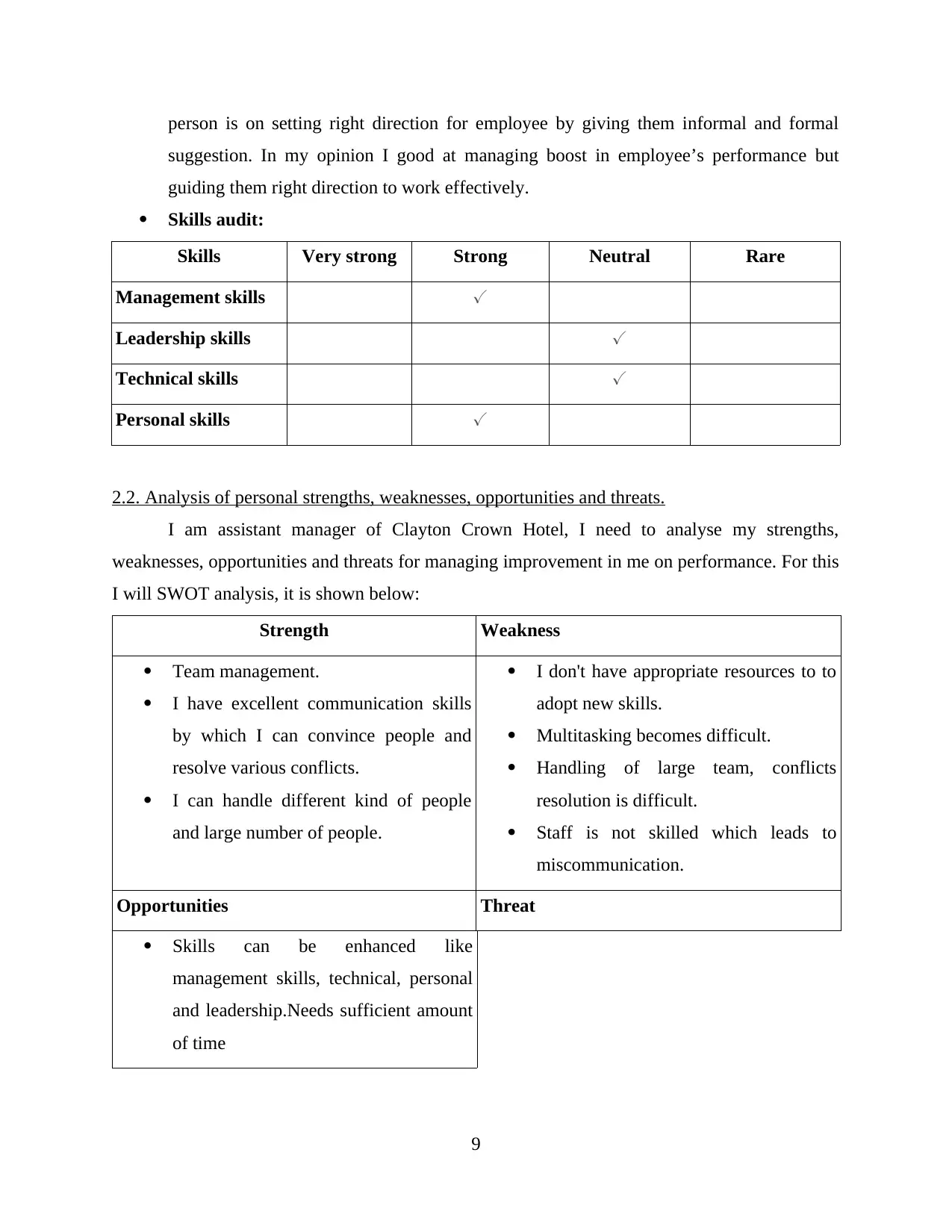
person is on setting right direction for employee by giving them informal and formal
suggestion. In my opinion I good at managing boost in employee’s performance but
guiding them right direction to work effectively.
Skills audit:
Skills Very strong Strong Neutral Rare
Management skills ✓
Leadership skills ✓
Technical skills ✓
Personal skills ✓
2.2. Analysis of personal strengths, weaknesses, opportunities and threats.
I am assistant manager of Clayton Crown Hotel, I need to analyse my strengths,
weaknesses, opportunities and threats for managing improvement in me on performance. For this
I will SWOT analysis, it is shown below:
Strength Weakness
Team management.
I have excellent communication skills
by which I can convince people and
resolve various conflicts.
I can handle different kind of people
and large number of people.
I don't have appropriate resources to to
adopt new skills.
Multitasking becomes difficult.
Handling of large team, conflicts
resolution is difficult.
Staff is not skilled which leads to
miscommunication.
Opportunities Threat
Skills can be enhanced like
management skills, technical, personal
and leadership.Needs sufficient amount
of time
9
suggestion. In my opinion I good at managing boost in employee’s performance but
guiding them right direction to work effectively.
Skills audit:
Skills Very strong Strong Neutral Rare
Management skills ✓
Leadership skills ✓
Technical skills ✓
Personal skills ✓
2.2. Analysis of personal strengths, weaknesses, opportunities and threats.
I am assistant manager of Clayton Crown Hotel, I need to analyse my strengths,
weaknesses, opportunities and threats for managing improvement in me on performance. For this
I will SWOT analysis, it is shown below:
Strength Weakness
Team management.
I have excellent communication skills
by which I can convince people and
resolve various conflicts.
I can handle different kind of people
and large number of people.
I don't have appropriate resources to to
adopt new skills.
Multitasking becomes difficult.
Handling of large team, conflicts
resolution is difficult.
Staff is not skilled which leads to
miscommunication.
Opportunities Threat
Skills can be enhanced like
management skills, technical, personal
and leadership.Needs sufficient amount
of time
9
⊘ This is a preview!⊘
Do you want full access?
Subscribe today to unlock all pages.

Trusted by 1+ million students worldwide
1 out of 22
Related Documents
Your All-in-One AI-Powered Toolkit for Academic Success.
+13062052269
info@desklib.com
Available 24*7 on WhatsApp / Email
![[object Object]](/_next/static/media/star-bottom.7253800d.svg)
Unlock your academic potential
Copyright © 2020–2026 A2Z Services. All Rights Reserved. Developed and managed by ZUCOL.





